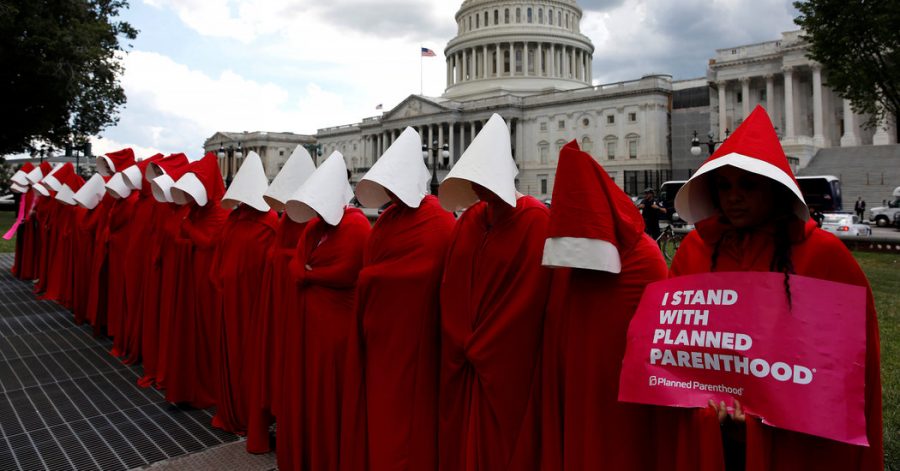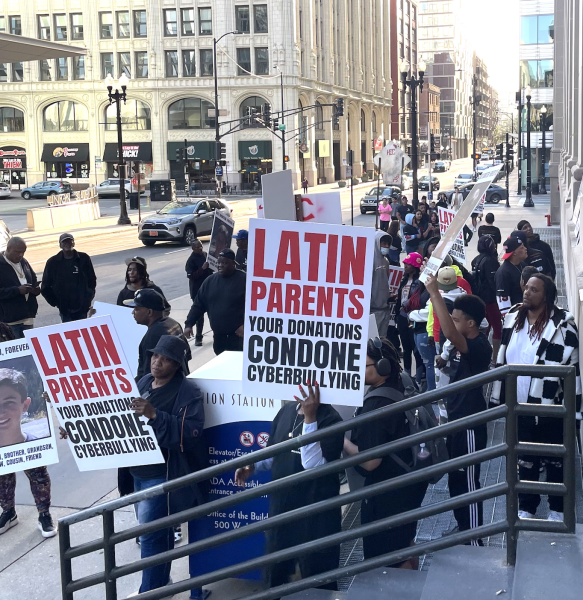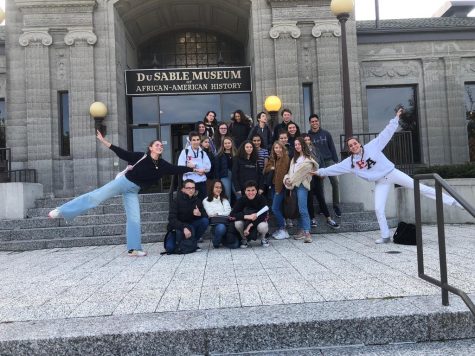Latin Reacts to Changes in Abortion Laws
June 1, 2019
On May 7, 2019, Georgia governor, Brian Kemp, signed the first “fetal heartbeat” abortion law, marking the start of a series of controversial bills concerning abortion rights that would continue throughout the month. The law, which effectively bans abortion after six weeks of pregnancy, is one of the most restrictive in the nation. Governors from Mississippi and Kentucky soon followed in Gov. Kemp’s footsteps by ratifying their own fetal heartbeat laws, and many other Republican-controlled states have expressed plans to do the same within the year.
The new laws have incited public outrage across the nation, with social media being the largest platform for debate. Talk show host Busy Phillips teamed up with the American Civil Liberties Union (ACLU) for an ad campaign to fight abortion bans, generating the hashtag #YouKnowMe. According to the ACLU, more than 87,000 Twitter users shared abortion stories via the hashtag. And Alabama’s recent measure, which proposes a near-total ban on abortion during all stages of pregnancy, has further escalated the moral and legal dialogue surrounding terminating pregnancies. The day Gov. Kemp signed the bill into law, May 16, the hashtag #AbortionIsAWoman’sRight was flooded with more than 154,000 tweets in the span of a few hours. Users on both sides of the issue turned to the hashtag to express their opinion.
Understanding the controversy behind these laws requires knowledge of how serious discussions about abortion began. A 1973 landmark U.S. Supreme Court case, Roe v. Wade, affirmed that access to safe and legal abortion is a constitutional right. Beforehand, illegal abortions made up at least one-sixth of pregnancy-related deaths. The law established the right to abortion as a fundamental right, restricting the legislation individual states can place on abortion. Even so, states are allowed to place ‘soft’ limitations on the administration of abortions such as laws requiring waiting periods before abortions and/or that women read certain types of literature and watch a fetal ultrasound before undergoing the procedure.
Georgia and Alabama’s measures violate these restrictions as both outlaw abortion during periods when the fetus is not considered viable outside the womb, even in cases of incest and rape. Conservative politicians have explained that they want the case to be brought to the Supreme Court in hopes of overturning the Roe v. Wade ruling. Considering the Supreme Court’s Republican majority, a Roe v. Wade overturn would not be unlikely.
While the majority of Americans do not support overturning Roe v. Wade, the nation is far from unified on the topic of abortion. According to a CBS News Poll earlier this month, two-thirds of respondents said they did not want Roe v. Wade overturned, but at the same time, half either wanted stricter limits on abortion or a complete ban.
Latin’s student body reflects the polarizing effect the new laws have had on the nation. Some students feel the laws, although controversial, represent a positive shift towards the abolition of abortion:
“I mostly support the bans and I’m hoping it will lead to the overthrow of Roe v. Wade, which I think is one of the worst decisions the Supreme Court has made,” said an anonymous male junior. “I agree with the vast majority of the bill, but the ban on children conceived from rape goes too far because it violates a woman’s bodily autonomy, as opposed to the 99% of abortions performed, where the woman voluntarily chose to have sex, and so cannot shirk her responsibility to her unborn child. I think that the reasonings for most abortions should be covered, as the vast majority are done for economic and/or social reasons.”
On the other hand, students like sophomore, Maeve Healy, are strongly opposed to the Alabama and Georgia bills. “Creating a life is a choice every woman should make for herself,” she said. “If you don’t like it, don’t get one. If your religious beliefs dictate that you should not get an abortion, don’t get one.
“To me, it is a very simple problem with a very simple solution. I have found that the people passing this bill do not really care about women and their choices. The only thing that I believe they truly care about are enforcing their own beliefs onto others. The people who are creating these laws are coming from places of privilege; however, they are failing to recognize that they are taking away the power women should have over their own bodies.”
Fellow Sophomore, Bella Campise agreed:
“I think the bill recently passed in Alabama is problematic in many ways. First, I believe that church and state should remain separate, so I don’t believe that religiously motivated decision-making is a thoughtful enough reason to sign or support the bill. No one should be able to place their religious obligations onto other members of society, and the ban directly contradicts that.
“Secondly, the bill will work out a lot differently in practice. There are hundreds of thousands of abortions per year and while they may be saving a clump of cells from being terminated, they cause hundreds of thousands of babies to be born into homes where they are not wanted. This will cause more abuse, more children in the foster care systems, and thus more crime, poverty, mental health issues, etc.
“So, if they really only cared about the babies, they should have thought this through. Furthermore, the fact that even rape victims cannot get abortions is absurd. It can be incredibly traumatizing to be forced to carry and give birth to the child. For those reasons, I can’t support this ban in any way shape or form.”
But for the majority of Latin students—and the majority of the nation—views on abortion lie somewhere in the middle. Sophomore, Nicole Lucas said, “I believe that all women have the choice to choose what the want to do with their bodies regardless of what I or anyone else thinks is right or wrong, although I do believe that if the baby is developed enough that it can feel pain while the pregnancy is being terminated, it should not be allowed.”
On the somewhat opposite end of the gray area, an anonymous male sophomore said, “To be honest, I don’t really have a stance, because I can see the argument from both sides. While I can understand where pro-lifers come from in seeing that stopping a natural process that will eventually produce a baby human could be considered murder, but I don’t necessarily see it that way, and I don’t think it should be regulated. With that being said, I don’t think that the sole purpose of this law is to maliciously oppress women as people claim. I think, especially with Alabama being tied for first in the nation with Mississippi as the most religious states, they see a fetus as a human life and want to protect it.”
As they often do nowadays, the battle between these ideologies has largely taken place via social media. While social media platforms are helpful in displaying a breadth of opinions, it hasn’t been as helpful when it comes to sharing accurate facts. Perhaps the most common miscommunication concerns who would be punished for abortions.
Alabama legislators want to make it clear that their measure was targeted at the doctors performing abortions rather than the women seeking them out. No individual would be charged for illegally seeking an abortion or having a miscarriage. Georgia law is slightly more complicated and does not specify that women will not be charged. However, other laws exist within the state meant to protect women from prosecution.
It is also important to note that bans on abortion not only affect women but every person who can give birth including trans and queer individuals. And in both Alabama and Georgia, the bills have not been put into effect and abortions are still available.
Last Friday, the American Civil Liberties Union and Planned Parenthood filed a lawsuit to challenge Alabama’s near-total abortion ban, almost guaranteeing that the case will make it to the Supreme Court.
“People think that this is only an issue in the South, but Illinois is actually struggling to pass our own Reproductive Health Act (HB 2495),” said junior Sehar Dey-Kohli. “And each person who has an abortion has had a different reason and experience. For some, they know immediately that they want to and do not need a lot of time to recover. For others, they agonize over the decision and ultimately realize they’re not in a good place to have a child. And some are caught in a medical emergency and do not even have time to reflect on the decision when their life is in danger. Each person’s story is different and generalizations can be dangerous.”
Maeve Healy said, “These laws are being created by white men and they disproportionately affect black and brown women. According to Harvard University, abortion has contributed significantly to a drop in crime. Being pro-choice does not mean pro-abortion. It means you have the power to choose what happens in your own body, not anybody else.”





















































